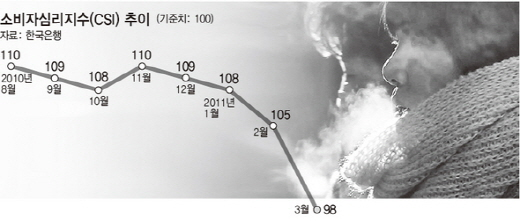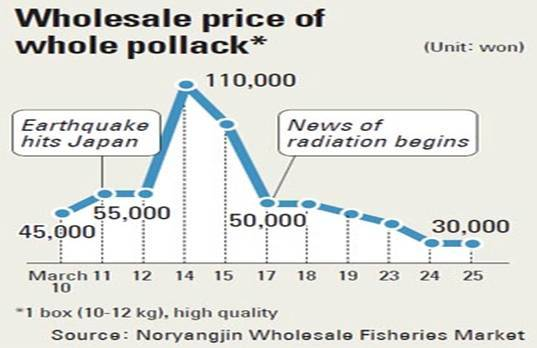
Market Information > 한국 농식품 시장뉴스
한국 농식품 시장뉴스
March 28, 2011
2011.03.28
[SERI FOCUS] Only a few regions provide the bulk of the country’s commodities
http://joongangdaily.joins.com/article/view.asp?aid=2934000
Summary: Soaring international commodity prices due to shortages are increasing the overall price tag on
Japanese funds return to S. Korean markets [English, OYS]
http://english.yonhapnews.co.kr/news/2011/03/28/0200000000AEN20110328000600320.HTML
Summary: SEOUL, March 28 (Yonhap) -- Japanese investors have been putting their money into the South Korean financial market even after Japan's devastating quake, data showed Monday, easing speculation that they may repatriate overseas assets to finance Japan's post-quake rehabilitation.
The 9.0-magnitude earthquake and ensuing tsunami hit the northeastern part of
http://english.yonhapnews.co.kr/news/2011/03/27/0200000000AEN20110327002500320.HTML
Summary:
As of the end of 2010, distressed loans held by local financial institutions was larger than that for 2000, said the report by Hyundai Research Institute, without disclosing the exact amount.
Consumer sentiment hits 29-month low[English, OYS]
http://english.hani.co.kr/arti/english_edition/e_national/470054.html

The consumer sentiment index (CSI) was 98 in March, 7 points lower than the previous month, the Bank of Korea said Friday. This marked the first time since April 2009, when the index was also at 98, that the index fell below 100.
A reading below 100 indicates that there are more people who are confident of the economy than not.
2. GRAIN & OILSEED ISSUES
Corn on the Cambodian cob suits Korean farmer [English, CSY]
FMD is over but milk remains in short supply [English, CSY]
http://joongangdaily.joins.com/article/view.asp?aid=2933973
Summary: Although the government on Thursday declared an end to the foot-and-mouth scourge and lowered the alert level for the disease that ravaged most of
Can "Foot-and-Mouth Disasters" Be Prevented with Policies Such as This? [English, CSY]
http://english.khan.co.kr/khan_art_view.html?artid=201103251402537&code=790101
http://english.yonhapnews.co.kr/business/2011/03/27/56/0501000000AEN20110327001200320F.HTML
Summary:
N.Korea in Urgent Request for Foot-and-Mouth Vaccine [English, CSY]
http://english.chosun.com/site/data/html_dir/2011/03/28/2011032800609.html
Full text:
British envoy says
http://english.yonhapnews.co.kr/news/2011/03/27/0200000000AEN20110327001700315.HTML
Summary: SEOUL, March 27 (Yonhap) -- Martin Uden, Britain's ambassador to South Korea, said Sunday that markets in Pyongyang, the capital of North Korea, appear to be well stocked with reasonably large amounts of food, poultry and electronic products, despite the communist state's ongoing search for food aid abroad.
Uden, who traveled to
Consumers shun seafood on rising radiation concerns [English, CSY]
The price of whole pollack first jumps and now falls on worries
http://joongangdaily.joins.com/article/view.asp?aid=2934024
Summary: While

Soju exports to
http://joongangdaily.joins.com/article/view.asp?aid=2934007
Summary: Exports of instant noodles and sugar to Japan rose sharply after a record earthquake hit the island nation earlier in the month, causing people and retailers to stock up on basic necessities, Korea’s Agriculture Ministry said yesterday. Cumulative shipments of instant noodles to
Exports of sugar, used in many processed food products, rose from 34.2 percent to 51.1 percent during the same period while there were also increases for soju and brown seaweed. Shipments of soju increased 8.6 percent on-year this year, but rose by 17.8 percent after the quake and the release of radioactive materials from the
Most arrivals from
http://english.yonhapnews.co.kr/news/2011/03/27/0200000000AEN20110327002300320.HTML
Summary:
The information in this report was compiled by the Agricultural Trade Office (ATO) at the U.S. Embassy in Seoul, South Korea. The press summaries contained herein do NOT reflect USDA, the U.S. Embassy, or other U.S. government agency official policy or view point. U.S. food exporters can learn more about market opportunities in South Korea by reviewing ATO Seoul’s Exporter Guide and other reports available at www.fas.usda.gov by clicking on “attaché reports”.
Agricultural Trade Office, U.S. Embassy - Seoul
Tel: 82-2-6951-6848 Fax: 82-2-720-7921
Email: atoseoul@state.gov